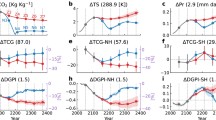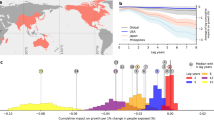Abstract
One potential impact from greenhouse-gas emissions is increasing damage from extreme events. Here, we quantify how climate change may affect tropical cyclone damage. We find that future increases in income are likely to double tropical cyclone damage even without climate change. Climate change is predicted to increase the frequency of high-intensity storms in selected ocean basins depending on the climate model. Climate change doubles economic damage, but the result depends on the parameters of the damage function. Almost all of the tropical cyclone damage from climate change tends to be concentrated in North America, East Asia and the Caribbean–Central American region. This paper provides a framework to combine atmospheric science and economics, but some effects are not yet modelled, including sea-level rise and adaptation.
This is a preview of subscription content, access via your institution
Access options
Subscribe to this journal
Receive 12 print issues and online access
$209.00 per year
only $17.42 per issue
Buy this article
- Purchase on Springer Link
- Instant access to full article PDF
Prices may be subject to local taxes which are calculated during checkout






Similar content being viewed by others
Change history
08 February 2012
In the version of this Article originally published online, the authors declared no competing financial interests. Although this remains the case, a clarification now appears in all versions.
References
Emanuel, K., Sundararajan, R. & William, J. Tropical cyclones and global warming: Results from downscaling IPCC AR4 simulations. Bull. Am. Meterol. Soc. 89, 347–367 (2008).
Webster, P. J., Holland, G. J., Curry, J. A. & Chang, H. R. Changes in tropical cyclone number, duration, and intensity in a warming environment. Science 309, 1844–1846 (2005).
IPCC Climate Change 2007: The Physical Science Basis (eds Soloman, S. et al.) (Cambridge Univ. Press, 2007).
Landsea, C. W., Harper, B. A., Hoarau, K. & Knaff, J. A. Can we detect trends in extreme tropical cyclones? Science 313, 452–454 (2006).
IPCC Climate Change 2001: Synthesis Report (eds Watson, R. T. et al.) (Cambridge Univ. Press, 2001).
Pielke, R. A. Jr & Landsea, C. W. Normalized tropical cyclone damages in the United States: 1925–1995. Weath. Forecast. 13, 621–631 (1998).
Pielke, R. A. Jr et al. Normalized tropical cyclone damage in the United States: 1900–2005. Nature Hazards Rev. 9, 1–29 (2008).
Hallegate, S. The use of synthetic hurricane tracks in risk analysis and climate change damage assessment. J. Appl. Met. Clim. 46, 1956–1966 (2007).
Emanuel, K. Increasing destructiveness of tropical cyclones over the past 30 years. Nature 436, 686–688 (2005).
Nordhaus, W. The economics of hurricanes and implications of global warming. Clim. Change Econ. 1, 1–24 (2010).
Pielke, R. A. Jr Future economic damage from tropical cyclones: Sensitivities to societal and climate changes. Phil. Tran. R. Soc. 365, 1–13 (2007).
Narita, D., Tol, R. S. J. & Anthoff, D. Damage costs of climate change through intensification of tropical cyclone activities: An application of FUND. Clim. Res. 39, 87–97 (2008).
EMDAT The OFDA/CRED International Disaster Database www.emdat.be (Universite Catholique de Louvain, 2009).
World Population in 2300 (Department of Economic and Social Affairs, 2004).
Gueremy, J. F., Deque, M., Braun, A. & Evre, J. P. Actual and potential skill of seasonal predictions using the CNRM contribution to DEMETER: Coupled versus uncoupled model. Tellus 57, 308–319 (2005).
Cubasch, U., Voss, R., Hegerl, G., Waskiewitz, J. & Crowley, T. Simulation of the influence of solar radiation variations on the global climate with an ocean-atmosphere general circulation model. Clim. Dynam. 13, 757–767 (1997).
Manabe, S., Stouffer, J., Spelman, M. J. & Bryan, K. Transient responses of a coupled ocean–atmosphere model to gradual changes of atmospheric CO2. Part I: Mean annual response. J. Clim. 4, 785–818 (1991).
Hasumi, H. & Emori, S. K-1 Coupled GCM (MIROC) Description (Center for Climate System Research, University of Tokyo, 2004).
Nicholls, R. J. et al. Ranking port cities with high exposure and vulnerability to climate change OECD Environment Working Paper No 1, Paris, France (2008).
World Bank–United Nations Natural Hazards, Unnatural Disasters: The Economics of Effective Prevention (World Bank, 2010).
IPCC Special Report on Emissions Scenarios (eds Nakicenovic, N. & Swart, R.) (Cambridge Univ. Press, 2000).
National Hurricane Center Tropical Cyclone Reports http://www.nhc.noaa.gov/pastall.shtml#tcr (National Oceanic Atmospheric Administration, 2009).
Stroble, I. & Schumaker, E. Economic Development and Losses Due to Natural Disasters: The Role of Risk. (Working Paper Ecole Polytechnique, 2008).
Tol, R. & Look, F. in Climate Change and Risk (eds Downing, T., Olsthom, A. & Tol, R.) 308–327 (Routledge, 1999).
Toya, H. & Skidmore, M. Economic development and the impact of natural disasters. Econ. Lett. 94, 20–25 (2007).
Acknowledgements
This paper was commissioned and financially supported by the Joint World Bank–United Nations project on the Economics of Disaster Risk Reduction and Recovery. The findings, interpretations and conclusions expressed in this paper are entirely those of the authors. We are grateful to W. Nordhaus, A. Sanghi, M. Toman and seminar participants at the World Bank, Yale University, and the United Nations for valuable comments and suggestions.
Author information
Authors and Affiliations
Contributions
R.M. and K.E. conceived the integrated assessment model and the climate-change experiment, K.E. carried out the atmospheric science component, S.C. and L.B. carried out the economics component and R.M. and K.E. co-wrote the paper.
Corresponding author
Ethics declarations
Competing interests
The authors declare no competing financial interests. However, in the interest of transparency we confirm that the tracks used for this paper were produced by WindRiskTech, LLC (www.windrisktech.com), which Kerry Emanuel founded with business partners in 2005. This paper was written once the results had been analysed for the World Bank, which bought these tracks from the firm. The firm's profit resulting from the sale of these tracks was not dependent on the results being formally published in a research journal. Dr Emanuel is also on the boards of two property and casualty companies: Homesite and Bunker Hill, and also on the board of the AlphaCat Fund, an investment fund dealing with re-insurance transactions. In all three cases, Dr Emanuel receives fixed fees but owns no stocks or shares. Dr Emanuel does not stand to make any personal financial gain through these directorships as a consequence of the reported findings.
Supplementary information
Rights and permissions
About this article
Cite this article
Mendelsohn, R., Emanuel, K., Chonabayashi, S. et al. The impact of climate change on global tropical cyclone damage. Nature Clim Change 2, 205–209 (2012). https://doi.org/10.1038/nclimate1357
Received:
Accepted:
Published:
Issue Date:
DOI: https://doi.org/10.1038/nclimate1357
This article is cited by
-
Stochastic simulation of storm surge extremes along the contiguous United States coastlines using the max-stable process
Communications Earth & Environment (2024)
-
Last millennium hurricane activity linked to endogenous climate variability
Nature Communications (2024)
-
Investigation of Meteorological Characteristics of Tropical Supercyclone Shaheen Insights from High-Resolution Satellite Observations
Journal of the Indian Society of Remote Sensing (2024)
-
Tropical cyclone risk assessment reflecting the climate change trend: the case of South Korea
Natural Hazards (2024)
-
More than unfamiliar environmental connection to super typhoon climatology
Scientific Reports (2023)



